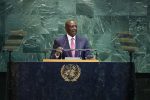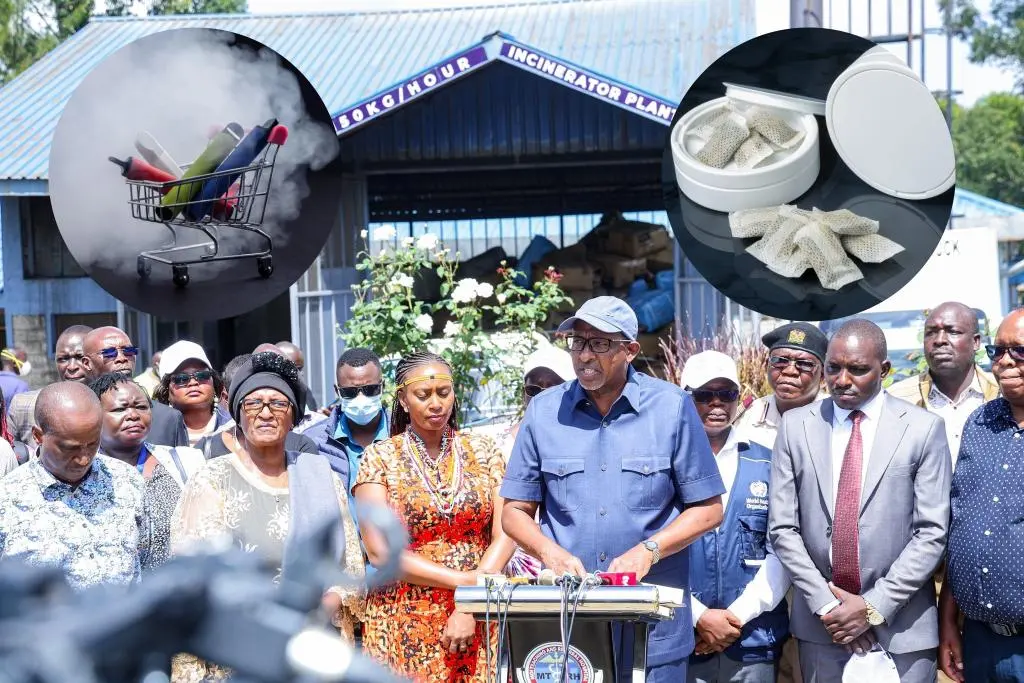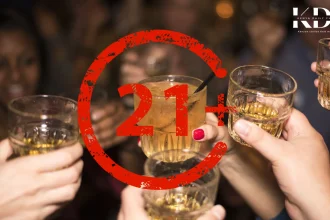In a step to protect public health and combat the proliferation of harmful substances, the Kenyan Ministry of Health has suspended all existing licenses and import clearances for nicotine and related products, effective immediately.
The announcement, made by Health Cabinet Secretary Aden Duale during the World No Tobacco Day commemorations at Moi Teaching and Referral Hospital (MTRH) in Eldoret, is aimed at safeguarding Kenyans, particularly the youth, from the dangers of tobacco and nicotine addiction.
The suspension targets the manufacture, importation, distribution, sale, and promotion of nicotine products, including shisha, gutkha, and flavoured e-cigarettes.
All persons or entities previously licensed have been given a 21-day window to reapply, submitting full compliance documentation for review.
This move comes as part of a broader initiative to curb the illicit trade of tobacco products, which globally undermines public health efforts and costs governments billions in lost tax revenue.
Destruction of Illicit Goods
The announcement coincided with the destruction of 5.5 tonnes of seized illicit tobacco products at MTRH, an event that drew significant attention as a symbol of Kenya’s resolve.
The destroyed products, which included highly addictive substances designed to appeal to young people, were flagged as delivering toxic chemicals that harm the brain, lungs, and overall health.
Speaking at the event, Duale emphasised the government’s moral and legal duty to act.
“These products are a direct threat to our youth, luring them with appealing flavours while delivering a cocktail of toxins that cause irreparable harm,” he said. “As a signatory to the WHO Framework Convention on Tobacco Control, Kenya is committed to eliminating the illicit trade of tobacco products and protecting our citizens from these preventable health risks.”
The Ministry of Health’s decision to suspend licenses is part of a multi-pronged strategy to tackle the growing challenge of illicit tobacco trade, which weakens the effectiveness of tobacco taxes and increases the affordability of harmful products.
The Border Management Committee, comprising the Kenya Revenue Authority (KRA), Kenya Bureau of Standards (KEBS), Immigration, Security agencies, and Port Health, was commended for its vigilance in intercepting these illegal imports.
Duale noted that the Ministry has significantly strengthened border surveillance and Port Health systems to prevent such threats from entering the country.
Principal Secretary for Public Health Mary Muthoni, who accompanied Duale, highlighted the importance of compliance with the Tobacco Control Act.
“This suspension is a wake-up call for all stakeholders in the nicotine product supply chain,” she said. “We are tightening the noose on non-compliance to ensure that only safe, regulated products—if any—reach the market.”
Duale urged citizens and leaders to make the right choices for the future of the nation, echoing sentiments from past World No Tobacco Day events in Kenya.
A Global Context
Kenya’s actions align with global efforts to combat the illicit tobacco trade, which undermines tobacco control interventions worldwide.
The World Bank has noted that illicit trade weakens the effect of tobacco excise taxes, making harmful products more accessible and increasing preventable morbidity and mortality.
Countries like the UK and Georgia have successfully reduced illicit trade by improving tax administration, a model Kenya appears to be following with its enhanced border controls and license suspension.
The suspension also reflects Kenya’s obligations under Article 5.3 of the WHO Framework Convention on Tobacco Control (FCTC) and the Protocol to Eliminate Illicit Trade in Tobacco Products, to which it is a signatory.
These international frameworks emphasise the need for robust policies to reduce tobacco consumption and protect public health.
As the 21-day reapplication period begins, the Ministry of Health has promised rigorous scrutiny of all submissions to ensure compliance with national laws and international standards.
The government’s actions signal a new era of enforcement, with a focus on creating a healthier, safer, and stronger Kenya.
For now, the suspension of nicotine product licenses stands as a bold statement of intent—one that prioritisee the well-being of Kenyans over the interests of an industry often criticised for targeting vulnerable populations.












